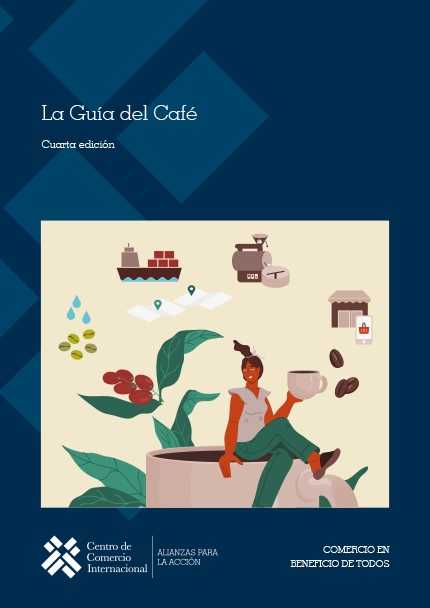GENEVA, Switzerland – The International Trade Centre (ITC), through its Alliances for Action initiative, unveiled at the 24th National Convention of Coffee and Cocoa in Lima, Peru, the Spanish translation of the fourth edition of the world’s most comprehensive, practical source for the international coffee trade, The Coffee Guide.
This new edition updates the latest trends of the last decade, especially for quality, digitalization, climate change, finance and risk and consumer preferences. It presents fresh industry data that classify production and consumption numbers by coffee quality segment (standard, premium and specialized) rather than the traditional Arabica/Robusta classification of data.
This guide is designed to be a practical tool for producers, exporters and other value chain stakeholders to support a positive transformation of the sector. It can be accessed globally and free of charge. It builds on collaboration with more than 70 coffee industry actors from across the globe, from seed to cup, to chart a path towards a more sustainable future for the industry. A focus on sustainability, inclusiveness and partnerships steer its content.
The Spanish translation pays tribute to all coffee sector stakeholders across Hispanic countries who wish to learn about and develop their knowledge in this environment.
This translation was facilitated thanks to the support of the Latin American and Caribbean Network of Fair Trade Small Producers and Workers (CLAC) and the International Coffee Organization who also informed this new edition with technical contributions`, data and statistics from CLAC’s Commercial Director Joao Mattos and ICO’s Executive Director Vanusia Nogueira, ED Emeritus José Sette, Head of Operations Gerardo Patacconi and Chief Economist Denis Seudieu.
The book, now already translated into French and Spanish, will be translated into Portuguese until the end of 2002 to address coffee stakeholders inclusively worldwide.
Partnerships for Latin America’s coffee sector
Latin America is the dominant producing region of Arabica coffee, with Brazil, Colombia, Honduras, Peru, Mexico, Guatemala and Nicaragua amongst the top 10 producing countries accounting for almost 80% of the world’s production.
A large percentage of the world’s coffee stakeholders, and producers especially, are therefore located in Latin America, making it a requirement that knowledge sharing products, events and online sector-related activities be made available in Spanish if we are to build a sustainable and inclusive coffee sector, moving forward.
At least 100 million families depend on the coffee supply chain for their livelihoods – ranging from farmers, traders, processors and roasters to distributors, marketers, packaging suppliers and baristas. Small producers are the backbone of the industry, yet at least 5.5 million live below the international poverty line of $3.20 a day.
The International Trade Centre’s Alliances for Action programme, through its partnership with CLAC, the ICO and other key partners from the industry is actively working to bridge this knowledge dissemination gap with the Coffee Guide and projects and programmes in the coffee sector that work on supporting coffee producers and micro, small and medium-sized enterprises in Latin America and worldwide.
Together with ITC-Alliances for Action, they are implementing the Fairtrade ‘Golden Cup’ coffee quality contest. Across 13 countries, Fairtrade coffee producers compete to see who has coffee of the highest quality. In a friendly atmosphere, the competition allows producers in each country to share their best coffees, exchange information and learn more about coffee quality. It focuses on promoting value addition in-country and developing competitiveness on global markets.
It is an opportunity to foster relationships with potential new buyers, and to connect producers directly to traders and roasters. On many occasions, many of the winning samples have been taken to international trade shows, such as the Specialty Coffee Expo (USA) and World of Coffee (Europe).
The guide explores the importance of value addition at origin, shifting dynamics in consumption, South-South trade and supporting the development of coffee consumption in producer countries where it is often still low.
Download The Coffee Guide in Spanish
The Coffee Guide, Fourth Edition (Spanish edition)


















